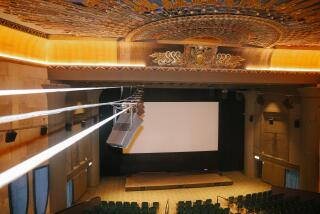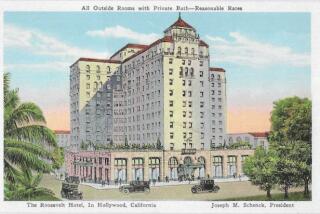Film restoration fit for a ‘King’
- Share via
In 1953, 20th Century Fox introduced the widescreen CinemaScope process in hopes of luring people from their televisions sets and back to the movie theaters. The novelty worked, and such early CinemaScope productions as “The Robe” and “How to Marry a Millionaire” packed theaters.
But there were problems.
“The lenses were fairly crude,” explains Schawn Belston, Fox’s vice president of asset management. “They had problem with depth of focus and the image sort of falling off on the edges.”
So Fox studio chief Darryl F. Zanuck decided to introduce a widescreen process called CinemaScope 55, which was twice as wide and tall as regular 35mm CinemaScope. Two of the studio’s lavish 1956 musicals, “Carousel” and “The King and I,” were shot in 55mm. But before the films were completed, Fox abandoned the format. Both movies were optically reduced to 35mm CinemaScope for release. The result, Belston says, “looks off color and not so great” -- and it’s the only version audiences have ever seen.
For the past year, Belston and his staff have been restoring the 55mm print of “The King and I,” the oh-so-romantic musical by Richard Rodgers and Oscar Hammerstein II, which won five Oscars, including best actor for Yul Brynner as the stubborn but charismatic King of Siam. The musical, which features such standards as “Getting To Know You” and “Shall We Dance?,” also was nominated for four more Academy Awards, including best film and best actress for Deborah Kerr, who played the English widow hired to tutor the king’s numerous offspring.
The restored print, with a remastered soundtrack, screens Friday at the Academy of Motion Picture Arts and Sciences Samuel Goldwyn Theatre.
CinemaScope 55, Belston says, was being developed around the same time as wide-screen formats such as Todd-AO and 70mm, which is used today. “Fox had committed to shoot ‘Carousel’ first and then ‘King and I’ in 55mm, with the idea that it would be sort of a new Fox large-format, road-show extravaganza,” Belston says. “But they ran into all sorts of technical problems.”
Movie projectors couldn’t be modified to screen the 55mm. “Most projectors today that can run 70mm can also convert to 35mm, but 55mm couldn’t make a projector that was convertible. So they would have had to make these projectors and send them on the road with the print. It quickly became completely impractical.”
“The King and I” has always been one of Belston’s favorite films and long on his restoration to-do list. But restoring the original 55mm was problematic. “To work with it, you had to build machines to deal with this odd, special gauge,” he explains. “It was expensive and quite challenging, and we never figured out the way to do it.”
Early last year, Belston found someone willing to build the equipment they needed to restore the film -- “reels, a synchronizer, a splicer. We had to modify a cleaning machine to clean the film, and we had to modify the mechanics of a printer.”
The original 55mm and preservation negatives from 1956 were still in the Fox vaults. “Since there was no interest or ability to deal with this material, when we opened the original negative cans, they were still wrapped in the original laboratory tissue papers from the 1950s. These cans hadn’t been touched in almost 50 years.”
There was fading in the De Luxe color on the duplicate negatives, “but the original camera negative is gorgeous. It had slightly faded but not to the point of being unusable. We ended up carefully inspecting and repairing the original negative and printing it to see what we were up against.”
After negative tears and fading problems were fixed, Belston made a 35mm reduction negative, and the four-channel soundtrack was digitally restored using original playback recording elements and original scoring elements.
The result is “unbelievable,” Belston says. “I was certainly completely knocked out by it. It is 100% better than I have ever seen it.”
*
‘The King and I’
Where: Samuel Goldwyn Theatre, Academy of Motion Picture Arts and Sciences, 8949 Wilshire Blvd., Beverly Hills
When: 8 p.m. Friday
Price: $5 general admission; $3 for academy members
Contact: (310) 247-3600 or go to www.oscars.org
More to Read
Only good movies
Get the Indie Focus newsletter, Mark Olsen's weekly guide to the world of cinema.
You may occasionally receive promotional content from the Los Angeles Times.











